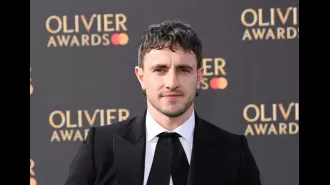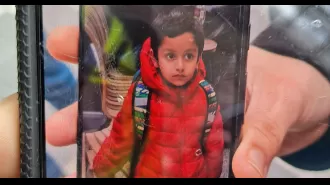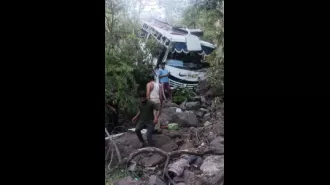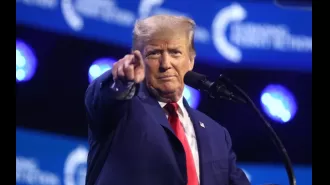People are drawing parallels between Robert Fico's shooting and the assassination of Franz Ferdinand.
Is the assassination of Robert Fico a potential trigger for a global conflict?
May 15th 2024.
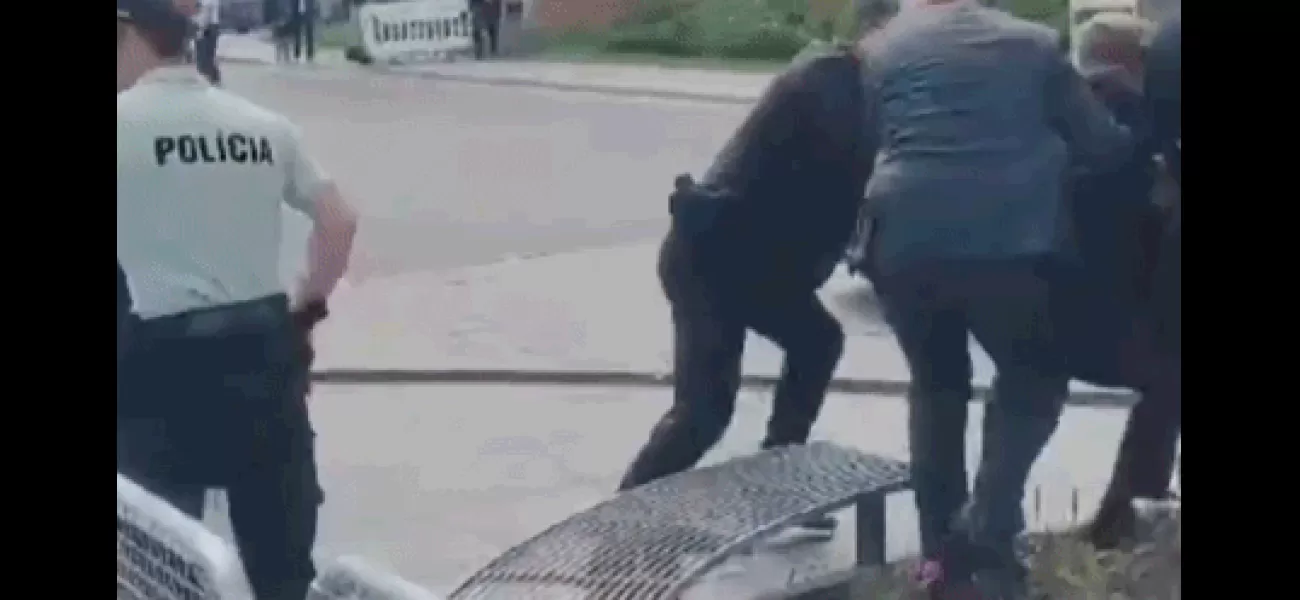
The recent assassination attempt against Slovakian Prime Minister Robert Fico has caused a wave of shock throughout the country. This kind of violence is unheard of in Slovakia, where politicians often travel with minimal security and mingle with the general public. Many fear that this attack could be the country's "Franz Ferdinand moment," bringing us closer to the looming threat of World War III. People are already drawing comparisons between this incident and the assassination of Archduke Franz Ferdinand, which triggered the start of World War I a month later.
Darina Malová, a professor at Comenius University in Bratislava, was among the many who were genuinely shocked by the shooting of Fico. This is not the first time that Slovakia, with its population of less than 6 million, has been rocked by political violence. In 1995, the kidnapping of the son of then-president Michal Kováč in neighboring Austria caused a stir. The case may finally come to trial this year after an amnesty granted to the suspects was revoked. In 2018, an investigative journalist was also shot dead, leading to Fico's resignation from power for five years.
However, over the past two years, Slovakia has experienced a surge in terrorism, with a neo-Nazi shooting two LGBTQ+ people outside a gay bar in 2022, and over a thousand bomb threats made in a single day last week, resulting in the evacuation of schools across the country. According to Malová, this increase in violence is due to the extreme polarization of Slovakian politics, with Fico at the center of it.
Robert Fico is a divisive figure in Slovakia, known for his Eurosceptic views, support for traditional family values, and disdain for journalists and political opposition. He has been a member of parliament since the 1990s and has been a dominant figure in politics for 20 years. Fico's early years in politics were marked by his membership in the Communist Party, but he eventually left to form his own party, Smer, in 1999. Smer was known for its promises of clean government and law and order, and it gained popularity among poorer sections of society, rural voters, and pensioners.
However, Fico's party faced a downfall in 2018 when journalist Ján Kuciak and his fiancée were assassinated while investigating corruption linked to senior government politicians. The targeted killing sparked widespread protests, eventually leading to Fico's resignation. He returned to power in 2020, leading a coalition of parties that are economically center-left, socially conservative, nationalist, and Eurosceptic. Fico has also been known for his close ties with Russia and his antagonistic views towards Ukraine.
Today, Fico was shot at a cultural community center in Handlova, a small town outside of the capital city, where he was attending a cabinet meeting. A 71-year-old local man shot at Fico after shouting his name, causing life-threatening injuries. This is not the first time that Fico has faced threats of violence, as he was previously named as a target by a murderer in 2022. People are now questioning the lax security that politicians in Central and Eastern Europe often have, as they fear that incidents like this could lead to more political violence and potentially even spark a global conflict.
Breaking News: Slovakian Prime Minister Target of Assassination Attempt
The entire nation of Slovakia was left reeling after news broke of an assassination attempt on their beloved Prime Minister, Robert Fico. In a country where such violence is virtually unheard of, the shocking incident has sparked fears of a potential World War III.
Unlike other Central and Eastern European politicians who often travel with a heavy security detail, Fico has always been known for his approachability and closeness to the general public. However, this lax security has now caused many to fear that Slovakia may have just experienced its own "Franz Ferdinand moment", bringing the country one step closer to the looming threat of a global conflict.
The media is already abuzz with comparisons between Fico's shooting and the notorious assassination of Archduke Franz Ferdinand, which ultimately led to the outbreak of World War I. The incident has left everyone in Slovakia, a small country with a population of less than 6 million, in a state of shock and disbelief. Darina Malová, a professor at Comenius University in Bratislava, expressed her sincere shock at the news, joining the rest of the nation in praying for Fico's recovery.
Sadly, this is not the first time in the past three decades that Slovakia has been rocked by political violence. In 1995, the son of then-president Michal Kováč was kidnapped in a neighboring country. The case may finally see justice this year after an amnesty granted to 13 individuals, including the former head of the security service, was revoked.
The wounded Prime Minister being rushed into a car after the shooting.
In 2018, an investigative journalist was shot dead, leading to Fico's resignation from power for five years. However, in recent years, Slovakia has seen an unprecedented rise in terrorism. In 2022, a neo-Nazi killed two members of the LGBTQ+ community outside a gay bar in Bratislava. In addition, just last week, over 1,100 bomb threats were made, causing schools across the country to be evacuated.
According to Malová, this increase in violence can be attributed to the extreme polarization of Slovakian politics. Fico, in particular, has been at the center of this divide.
So who exactly is Robert Fico and what are his political views?
Fico is a well-known Eurosceptic and vocal supporter of Russian President Vladimir Putin, with a conservative stance on traditional family values. He has also been known for his disdain towards journalists and political opposition. Currently in his third term as Prime Minister, Fico has been a dominant figure in Slovakian politics for the past 20 years, having been a member of parliament since the 1990s.
Kevin Deegan-Krause, a professor at Wayne State University, describes Fico as a "talented lawyer" and a "young, semi-reformer" before the country's Velvet Revolution in 1989. Despite not initially being interested in the transition to democracy, Fico eventually left the Communist Party to join the Party of the Democratic Left, which was more oriented towards democracy and the market.
However, frustrated by a slow rise through the ranks, Fico left the party in 1999 to launch his own party, Smer, which means "Direction" in English. Deegan-Krause describes Smer as being "a little bit Blairite", with a focus on clean government, law and order, and a flirtation with anti-Hungarian nationalism during their time in government from 2006 to 2010. This has made Fico particularly popular among rural voters, pensioners, and the poorer sections of society.
In recent years, Slovakia has seen a surge in anti-migrant and anti-Islam sentiments, which have been capitalized on by Fico's party. This was particularly evident during Europe's refugee crisis in 2015, while Fico was serving his second term as Prime Minister. However, his government was forced to resign in 2018 after the assassination of journalist Ján Kuciak and his fiancée, Martina Kušnírová. The targeted killing, which remains unsolved, sparked widespread protests and ultimately led to Fico's resignation.
Fico with his ally, Russian President Vladimir Putin, whom many fear his government will try to emulate following the assassination attempt.
Despite this setback, Fico made a strong comeback in the October 2020 election, leading a coalition of parties with a mix of economic center-left, socially conservative, nationalist, and Eurosceptic ideologies. During his campaign, Fico promised not to "send a single round to Ukraine", breaking away from NATO and reflecting his long-standing allegiance to Putin's authoritarian regime in Russia.
In addition to his attempts to bring the media and courts under his control and stop corruption investigations into his allies, Fico has also been known to be antagonistic towards Ukraine. In 2009, he blamed the country for causing Russia to cut off gas supplies to Slovakia, which heavily relies on Russian gas. He has also repeatedly pressured Ukraine to sign a peace treaty with Russia, saying that "Russia will never leave Crimea, never leave the territories that it controls."
But what exactly happened during the shooting?
Today's incident was not the first time that Fico has faced threats of violence. In his manifesto, the 19-year-old who murdered two members of the LGBTQ+ community in 2022 had listed Fico and the then-Prime Minister Eduard Heger as targets. However, it is believed that Heger was the shooter's initial target, with the shooter even waiting outside the politician's home.
But today, a shooter managed to get close enough to Fico to fire several shots, injuring the Prime Minister. The incident took place in Handlova, a small town northeast of the capital, where Fico was visiting a community center for a cabinet meeting. He was eventually flown to a hospital with life-threatening injuries. The suspected shooter, a 71-year-old local man, was arrested by police after reportedly shouting "Robo, come here" before firing at Fico.
The entire nation is now anxiously waiting for updates on Fico's condition and praying for his full recovery. This incident has once again brought to light the dangers of political polarization and the need for stricter security measures for public figures. As Slovakia grapples with the aftermath of this shocking event, one can only hope for a peaceful and united future for the country.
Darina Malová, a professor at Comenius University in Bratislava, was among the many who were genuinely shocked by the shooting of Fico. This is not the first time that Slovakia, with its population of less than 6 million, has been rocked by political violence. In 1995, the kidnapping of the son of then-president Michal Kováč in neighboring Austria caused a stir. The case may finally come to trial this year after an amnesty granted to the suspects was revoked. In 2018, an investigative journalist was also shot dead, leading to Fico's resignation from power for five years.
However, over the past two years, Slovakia has experienced a surge in terrorism, with a neo-Nazi shooting two LGBTQ+ people outside a gay bar in 2022, and over a thousand bomb threats made in a single day last week, resulting in the evacuation of schools across the country. According to Malová, this increase in violence is due to the extreme polarization of Slovakian politics, with Fico at the center of it.
Robert Fico is a divisive figure in Slovakia, known for his Eurosceptic views, support for traditional family values, and disdain for journalists and political opposition. He has been a member of parliament since the 1990s and has been a dominant figure in politics for 20 years. Fico's early years in politics were marked by his membership in the Communist Party, but he eventually left to form his own party, Smer, in 1999. Smer was known for its promises of clean government and law and order, and it gained popularity among poorer sections of society, rural voters, and pensioners.
However, Fico's party faced a downfall in 2018 when journalist Ján Kuciak and his fiancée were assassinated while investigating corruption linked to senior government politicians. The targeted killing sparked widespread protests, eventually leading to Fico's resignation. He returned to power in 2020, leading a coalition of parties that are economically center-left, socially conservative, nationalist, and Eurosceptic. Fico has also been known for his close ties with Russia and his antagonistic views towards Ukraine.
Today, Fico was shot at a cultural community center in Handlova, a small town outside of the capital city, where he was attending a cabinet meeting. A 71-year-old local man shot at Fico after shouting his name, causing life-threatening injuries. This is not the first time that Fico has faced threats of violence, as he was previously named as a target by a murderer in 2022. People are now questioning the lax security that politicians in Central and Eastern Europe often have, as they fear that incidents like this could lead to more political violence and potentially even spark a global conflict.
Breaking News: Slovakian Prime Minister Target of Assassination Attempt
The entire nation of Slovakia was left reeling after news broke of an assassination attempt on their beloved Prime Minister, Robert Fico. In a country where such violence is virtually unheard of, the shocking incident has sparked fears of a potential World War III.
Unlike other Central and Eastern European politicians who often travel with a heavy security detail, Fico has always been known for his approachability and closeness to the general public. However, this lax security has now caused many to fear that Slovakia may have just experienced its own "Franz Ferdinand moment", bringing the country one step closer to the looming threat of a global conflict.
The media is already abuzz with comparisons between Fico's shooting and the notorious assassination of Archduke Franz Ferdinand, which ultimately led to the outbreak of World War I. The incident has left everyone in Slovakia, a small country with a population of less than 6 million, in a state of shock and disbelief. Darina Malová, a professor at Comenius University in Bratislava, expressed her sincere shock at the news, joining the rest of the nation in praying for Fico's recovery.
Sadly, this is not the first time in the past three decades that Slovakia has been rocked by political violence. In 1995, the son of then-president Michal Kováč was kidnapped in a neighboring country. The case may finally see justice this year after an amnesty granted to 13 individuals, including the former head of the security service, was revoked.
The wounded Prime Minister being rushed into a car after the shooting.
In 2018, an investigative journalist was shot dead, leading to Fico's resignation from power for five years. However, in recent years, Slovakia has seen an unprecedented rise in terrorism. In 2022, a neo-Nazi killed two members of the LGBTQ+ community outside a gay bar in Bratislava. In addition, just last week, over 1,100 bomb threats were made, causing schools across the country to be evacuated.
According to Malová, this increase in violence can be attributed to the extreme polarization of Slovakian politics. Fico, in particular, has been at the center of this divide.
So who exactly is Robert Fico and what are his political views?
Fico is a well-known Eurosceptic and vocal supporter of Russian President Vladimir Putin, with a conservative stance on traditional family values. He has also been known for his disdain towards journalists and political opposition. Currently in his third term as Prime Minister, Fico has been a dominant figure in Slovakian politics for the past 20 years, having been a member of parliament since the 1990s.
Kevin Deegan-Krause, a professor at Wayne State University, describes Fico as a "talented lawyer" and a "young, semi-reformer" before the country's Velvet Revolution in 1989. Despite not initially being interested in the transition to democracy, Fico eventually left the Communist Party to join the Party of the Democratic Left, which was more oriented towards democracy and the market.
However, frustrated by a slow rise through the ranks, Fico left the party in 1999 to launch his own party, Smer, which means "Direction" in English. Deegan-Krause describes Smer as being "a little bit Blairite", with a focus on clean government, law and order, and a flirtation with anti-Hungarian nationalism during their time in government from 2006 to 2010. This has made Fico particularly popular among rural voters, pensioners, and the poorer sections of society.
In recent years, Slovakia has seen a surge in anti-migrant and anti-Islam sentiments, which have been capitalized on by Fico's party. This was particularly evident during Europe's refugee crisis in 2015, while Fico was serving his second term as Prime Minister. However, his government was forced to resign in 2018 after the assassination of journalist Ján Kuciak and his fiancée, Martina Kušnírová. The targeted killing, which remains unsolved, sparked widespread protests and ultimately led to Fico's resignation.
Fico with his ally, Russian President Vladimir Putin, whom many fear his government will try to emulate following the assassination attempt.
Despite this setback, Fico made a strong comeback in the October 2020 election, leading a coalition of parties with a mix of economic center-left, socially conservative, nationalist, and Eurosceptic ideologies. During his campaign, Fico promised not to "send a single round to Ukraine", breaking away from NATO and reflecting his long-standing allegiance to Putin's authoritarian regime in Russia.
In addition to his attempts to bring the media and courts under his control and stop corruption investigations into his allies, Fico has also been known to be antagonistic towards Ukraine. In 2009, he blamed the country for causing Russia to cut off gas supplies to Slovakia, which heavily relies on Russian gas. He has also repeatedly pressured Ukraine to sign a peace treaty with Russia, saying that "Russia will never leave Crimea, never leave the territories that it controls."
But what exactly happened during the shooting?
Today's incident was not the first time that Fico has faced threats of violence. In his manifesto, the 19-year-old who murdered two members of the LGBTQ+ community in 2022 had listed Fico and the then-Prime Minister Eduard Heger as targets. However, it is believed that Heger was the shooter's initial target, with the shooter even waiting outside the politician's home.
But today, a shooter managed to get close enough to Fico to fire several shots, injuring the Prime Minister. The incident took place in Handlova, a small town northeast of the capital, where Fico was visiting a community center for a cabinet meeting. He was eventually flown to a hospital with life-threatening injuries. The suspected shooter, a 71-year-old local man, was arrested by police after reportedly shouting "Robo, come here" before firing at Fico.
The entire nation is now anxiously waiting for updates on Fico's condition and praying for his full recovery. This incident has once again brought to light the dangers of political polarization and the need for stricter security measures for public figures. As Slovakia grapples with the aftermath of this shocking event, one can only hope for a peaceful and united future for the country.
[This article has been trending online recently and has been generated with AI. Your feed is customized.]
[Generative AI is experimental.]
0
0
Submit Comment

